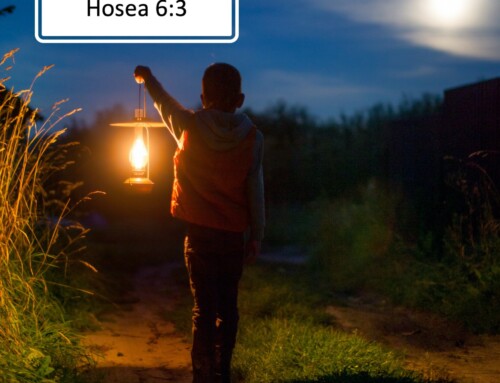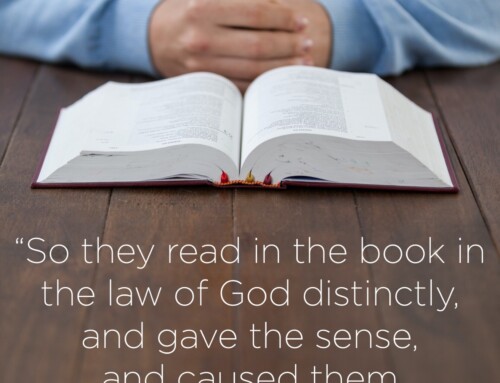WHY WORRY!
“Be careful for nothing; but in every thing by prayer and supplication with thanksgiving let your requests be made known unto God.” Philippians 4:6
In Philippians 4:6 we are exhorted to be “careful” for nothing. We have here a word that has changed its meaning. Today it means to exercise caution. But when our translation was made, it meant to be full of anxious care. The Greek word is used in a second-century sentence, “I am writing in haste to prevent your being anxious, for I will see that you are not worried.” The word therefore is a synonym for the word “worry.” The force of the word in the Greek is that of forbidding the continuance of an action already going on. Thus the translation is, “Stop perpetually worrying about even one thing.” The same Greek word is found in Matthew 6:25 and is translated, “Take no thought.” We have the same force of the Greek here. “Stop perpetually worrying.” This recognizes the habitual attitude of the unsaved human heart toward the problems and difficulties of life. God commands us, “Stop perpetually worrying about even one thing.” We commit sin when we worry. We do not trust God when we worry. We do not receive answers to prayer when we worry, because we are not trusting.
But this command not to worry is founded upon a reasonable basis. That is, there is a reason why we need not worry. In 1 Peter 5:7 we have, “Casting all your care upon him, for he cares for you.” The word “care” is from the same Greek word. We are commanded to cast all our worry upon Him. The word “cast” is not the ordinary word in Greek which means “to throw,” but one which signifies a definite act of the will in committing to Him our worries, in giving them to Him. In other words, we are done worrying about the matter and will let God assume the responsibility.
And that is just what He desires to do. We are to commit to Him all our worries (or the things that would worry us if we assumed the responsibility) because He cares for us. But in this instance the word “cares” is not the word for “worry” in the Greek. The expression in the original literally means “is a care to him concerning you.” In other words, your welfare is His concern. By bringing you into His family, He has undertaken the responsibility of caring for your welfare. Therefore, if that is true, why worry?
There is on record in an early Greek manuscript the name of a man called Titedios Amerimnos. The first name is a proper name. The second name is made up of the word which means “to worry” with the Greek letter Alpha prefixed to it, which makes the word mean the opposite of what it formerly meant. It is thought that this man was a pagan Greek who perpetually worried, but who, after being saved, stopped worrying. So he was called, “Titedios, the Man who Never Worries.” Can we write our name and add to it, “The One Who Never Worries”? – Kenneth Wuest
The Lord's Day Services
Sunday, September 20, 2020
11:00 a.m. Morning Worship – Mr. Frank D’Addurno (Church open. Click here for SermonAudio)
5:50 p.m. Pre-service Prayer – held in the church basement and on Zoom
6:30 p.m. Evening Worship – Pastor Daniel Olson (Church open. Click here for SermonAudio)
Weekly Announcements
Wednesday, September 23rd
7:30 p.m. Bible Study & Prayer – Dr. Saunders – via Zoom
Advanced Announcements
Sunday, September 27th
11:00 a.m. Morning Worship – Dr. Larry Saunders
5:50 p.m. Pre-service Prayer – held in the church basement and on Zoom
6:30 p.m. Evening Worship – Dr. Larry Saunders
Wednesday, September 30th
7:30 p.m. Annual General Meeting – via Zoom
Annual General Meeting
Our Annual General Meeting will be on Wednesday, September 30th at 7:30 p.m. via Zoom. Normally our AGM would have been held in April; however, it was put on hold due to the pandemic. The financial report will be emailed out to the congregation shortly.
LTBS Quarterly - September 2020
The latest edition of the LTBS Quarterly is now available online. Click here to view the September 2020 edition along with all previous ones.
The Children's Catechism - Doctrine
Q20. Who enables us to trust in and love Jesus?
A. The Holy Spirit.
The Shorter Catechism
Q20. Did God leave all mankind to perish in the estate of sin and misery?
A. God having, out of his mere good pleasure, from all eternity, elected some to everlasting life1, did enter into a covenant of grace, to deliver them out of the estate of sin and misery, and to bring them into an estate of salvation by a Redeemer2.
1. According as he hath chosen us in him before the foundation of the world, that we should be holy and without blame before him in love: (Ephesians 1:4).
2. But now the righteousness of God without the law is manifested, being witnessed by the law and the prophets; Even the righteousness of God [which is] by faith of Jesus Christ unto all and upon all them that believe. (Romans 3:21-22).












